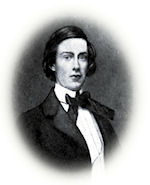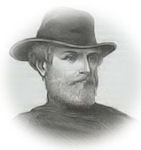
July 28th, 1861.
Dear Mother:
A week has passed since our misfortunes at Bull’s Run, and in all the intervening time I’ve had only opportunity to let you know that I was safe. But I must tell you something of that unlucky day, for I know you had rather have the story from my own lips. As I promised Henry Goddard to write once in a while for the Bulletin, I will put my story in a form to suit that sheet, if you think proper to communicate it: —
We too have breathed into our nostrils the smoke of battle, we too have listened to the voice of the cannon, we too have seen the finest of pagents, the most splendid of dramatic spectacles — the death struggle between armed arrays of men. We, who only yesterday were numbered among the “Sons of the Muses,” find ourselves today counted among the full-fledged “Sons of Mars.” We have fought, suffered, and survived to tell our tale. “To-morrow morning at 2 o’clock be ready for an advance, provided with a couple of day’s provisions,” is the command we receive on Saturday evening, and at the chilly hour appointed, without the sounding of the Reveillé, we are noiselessly summoned to our Arms. We stand in silence at our posts until the red glare of the rising sun had followed the dark hour before dawn. Then we marched on, gay of heart, and full of confidence. We cross Bull’s Run, and see men cutting trees by the bridge. We ask their reason. “It is to cover a retreat,” they tell us. “Ho! Ho!” How we laughed at the thought of our retreating! What innocent woodmen those were that could talk of us defeated! It was a bonnie sight to see us then, eager for battle, dreaming of victory. Some three miles we marched on, and then were drawn in the woods in line of battle. In line we advanced till we came to the edge of the forest, where we were told to lie down to avoid the range of the enemy’s cannon. About 6 o’clock a couple of pieces of our artillery to the left of us opened a fire upon such of an unseen foe as our skirmishers were able to discover. Long our pieces were unanswered. How glorious, we thought, this firing on the foe, and ourselves in seeming safety! How we laughed when afar we could see an exploding shell scattering the enemy in confusion, who for a short moment were thus forced to show themselves on open ground. The fields before us were occupied by our officers reconnoitring. Away off on the line of wood-covered hills two or three miles away, we could see the glitter of bayonets. Seen from a tree, they were found to belong to fine troops, well equipped, and marching in order — troops not to be scattered by threats, but worthy of being combatted. Upon an elevated open space of ground before us to the right, we could see more troops moving — horsemen riding — above all one on a white horse who seemed to be everywhere. The sun grew warm and we became listless. The artillery continued to discharge its Death messengers, the sharp rattle of musketry was heard to our right, volley after volley following in quick succession, yet many of us slept, quietly awaiting our turn to be summoned to action. About 11 o’clock two horses came galloping riderless toward us. While surmising whence they came, we were called to rise and march to battle. We sprung from the earth like the armed men of Cadmus. On we rushed by the flank, over fields, through woods, down into ravines, plunging into streams, up again onto rising meadows, eager, excited, thrilled with hot desire to bear our share in routing the enemy. We cheered, and yelled, pressing onward, regardless of shells now and then falling among us, thinking only of a sharp fight and a certain victory. At last we reached the lines of the brave boys of the 69th. Here the American banner was planted, so we shouted lustily, for the spot had not long since been wrung from the foe.
From many a point not long since covered by secession forces, the American banner now floated. What wonder we felt our hearts swelling with pride, and saw, hardly noticing, horse and rider lying stiff, cold and bloody together! What, though we stepped unthinking over the pale body of many a brave fellow still grasping convulsively his gun, with the shadows of Death closing around him! We were following the foe, I have said, and were dreaming only of victory. So we were marched to the edge of a slope which sheltered us partially from the aim of the enemy’s artillery. Here lying prostrate, shell after shell flew over our heads, or tore up the ground around. Now we could feel the hot breath of a cannon ball fan our cheeks; now we could see one fairly aimed, falling among our horses, and rolling them prostrate; and now again one of these messengers would come swift into the ranks of one of our columns, and without a thought or a groan, a soul was hurried into eternity.
After about an hour in this trying position, we were called up and turned into the road, where Death began to make sad havoc in our ranks. Surely aimed, the shot of the enemy fell among us. We could not see the foe, and then it was terrible to see our own boys, whose faces we knew, and whose hands we had pressed, falling in Death agony. We heard, while marching stealthily, a great shout, and looking we saw a hill before us, covered with the Ellsworth Zouaves. A moment more, and from the top of the hill, from unseen hands blazed a terrible discharge of arms. It was one of those masked batteries, which have so often brought us misfortune. Bravely fought the Zouaves, but they had to fall back from that hellish fire. Other Regiments made the charge, but only to be repulsed with ranks thinned and broken. At length our turn came. Up we rushed — our brave Colonel with us.
The first fire swept our ranks like a quick darting pestilence. “Rally, boys—Rally!” shouted the officers, and a brave rally was made. Our men stood firmly firing, answering volley by volley. Here we felt the worthlessness of our old Harper’s Ferry muskets, when matched against the rifles of the enemy. Tall men were mowed down about me. Wounded men begged their comrades to press on, and not to risk anything by lingering near them. We were only some twenty yards from a battery, belching forth a thick heavy hail of grape and canister, shell and fire of musketry. With unerring accuracy the enemy’s riflemen singled out our officers and mighty men. Suddenly we saw the American flag waving over the battery. “Cease firing” was the order given, and for a short moment we believed the battery was ours. It was the enemy though that had raised the flag to deceive us. As we lowered our arms, and were about to rally where the banner floated, we were met by a terrible raking fire, against which we could only stagger.
“By the Lord, but I believe them coons’s too cunning for us!” cried an old soldier near me. We halted, fell back, and the hillside was left to such only as lingered to bear away their wounded comrades.
As we passed down we saw our Colonel lying still, in the hands of Death. He had fallen bravely, breast to the foe, not wishing to cherish his own life, while the lives of his men were imperilled. Over the sad disheartening retreat let us not linger — let it be covered by the darkness of the night which followed. We took with us 750 brave men into the battle, but our roll call shows that 199 are numbered among the dead, the wounded, and the missing. Six captains of ours are silent now when their names are called. They died with many of their men, careless of Death, willing to give up all things, even life in its sweetness, for the good of the Republic. “Dulce et decorum est pro patria mori.”
L. of the 79th.
I have received only three letters from you, the rest probably having been intercepted by the enemy while I was in Virginia.
Very affec’y.,
Will Lusk.









 Now, Mrs. Stanard came for Mrs. Preston and me to drive to the camp in an open carriage. A man riding a beautiful horse joined us. He wore a hat with something of a military look to it, sat his horse gracefully, and was so distinguished at all points that I very much regretted not catching his name as Mrs. Stanard gave it to us. He, however, heard ours, and bowed as gracefully as he rode, and the few remarks he made to each of us showed he knew all about us.
Now, Mrs. Stanard came for Mrs. Preston and me to drive to the camp in an open carriage. A man riding a beautiful horse joined us. He wore a hat with something of a military look to it, sat his horse gracefully, and was so distinguished at all points that I very much regretted not catching his name as Mrs. Stanard gave it to us. He, however, heard ours, and bowed as gracefully as he rode, and the few remarks he made to each of us showed he knew all about us.
